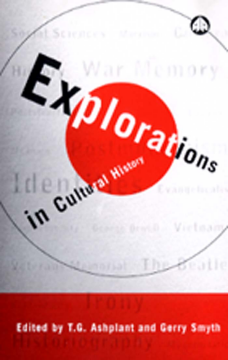
Additional Information
Book Details
Abstract
History is an invention in the present, as much as a representation and interpretation of the past. This has opened up innovative approaches to the research and writing of history, and it is the two ideas central to this theme - that culture is historically conditioned and history culturally conditioned – that this book explores.
Both theoretical and practical in its approach, this volume explains the development of cultural history, and its impact on current teaching. Part One examines the ways in which conceptions of historical meaning have been challenged via developments in a range of disciplines (including literary and linguistic theory, history, sociology, anthropology, media and cultural studies). Part Two looks at four case studies drawn from America and Britain: the Vietnam Veterans' Memorial, the music of the Beatles, the social documentary of George Orwell, and the political polemics of nineteenth-century British radical women.
'Clear, balanced, student-friendly introductions'
Labour History Review
Table of Contents
| Section Title | Page | Action | Price |
|---|---|---|---|
| Contents | iv | ||
| Preface and Acknowledgements | ix | ||
| Note on Citations | xi | ||
| PART 1 IN SEARCH OF CULTURAL HISTORY | 1 | ||
| 1 Schools, Methods, Disciplines, Influences | 3 | ||
| 1.1 Cultural History: Versions and Definitions | 3 | ||
| 1.2 Marxist Historiography and Cultural Theory | 10 | ||
| 1.3 The Annales Historians, Anthropology and the New Cultural History | 20 | ||
| 1.4 Foucault and New Historicism | 27 | ||
| 1.5 Poststructuralism and Postmodernism | 35 | ||
| 1.6 Popular Culture and Cultural Studies | 43 | ||
| Bibliographies | 52 | ||
| Preface and Acknowledgments | 52 | ||
| 1.1 Cultural History: Versions and Definitions | 52 | ||
| 1.2 Marxist Historiography and Cultural Theory | 53 | ||
| 1.3 The Annales Historians, Anthropology and the New Cultural History | 55 | ||
| 1.4 Foucault and New Historicism | 57 | ||
| 1.5 Poststructuralism and Postmodernism | 59 | ||
| 1.6 Popular Culture and Cultural Studies | 60 | ||
| PART 2 CASE STUDIES | 63 | ||
| 2 'What right have women to interfere with politics?': The Address of the Female Political Union of Birmingham to the Wome | 65 | ||
| What Right Have Women to Interfere with Politics? Political Rhetoric and the Construction of Identity | 69 | ||
| 'Women Have Thought so Little Upon Politics': The Political History of Women in Birmingham | 77 | ||
| 'Let This be Your Reply': The Political Discussions of the Female Political Union | 84 | ||
| 'Taking Part Publicly in Angry Political Discussions': Gender and the Construction of Political Authority | 87 | ||
| Conclusion | 96 | ||
| Bibliography | 98 | ||
| 3 'A secret conviction that nothing can be changed', or 'Abolishing a part of yourself'?: George Orwell's The Road to Wig | 101 | ||
| Historical Context | 101 | ||
| Authorship | 103 | ||
| Social Investigation | 107 | ||
| Documentary and Realism | 109 | ||
| Political Polemic | 110 | ||
| Autobiography | 115 | ||
| Contemporary Reception | 116 | ||
| Later Interpretations | 118 | ||
| Women in Wigan Pier | 119 | ||
| Voice and Persona | 122 | ||
| Androcentrism | 124 | ||
| Notes | 129 | ||
| Bibliography | 133 | ||
| 4 'A black gash of shame', or 'The wings of an abstract bird'? : The Vietnam Veterans Memorial (1982) | 139 | ||
| The Conception | 141 | ||
| The Controversy | 144 | ||
| The Compromise | 147 | ||
| A Dialogic Space | 149 | ||
| The Names | 151 | ||
| The Journey | 154 | ||
| The Offerings | 155 | ||
| Making Memory | 157 | ||
| Notes | 163 | ||
| Bibliography | 166 | ||
| 5 'I'd Love to Turn You On': The Beatles' Sgt. Pepper's Lonely Hearts Club Band (1967) | 169 | ||
| The Rise of Rock 'n' Roll and the Beginning of The Beatles | 171 | ||
| Cultural, Political and Musical Contexts | 177 | ||
| The Text | 182 | ||
| Reception | 189 | ||
| Conclusion | 194 | ||
| Bibliography | 196 | ||
| Index | 199 | ||
| Abbey Road Studios | 180 |
